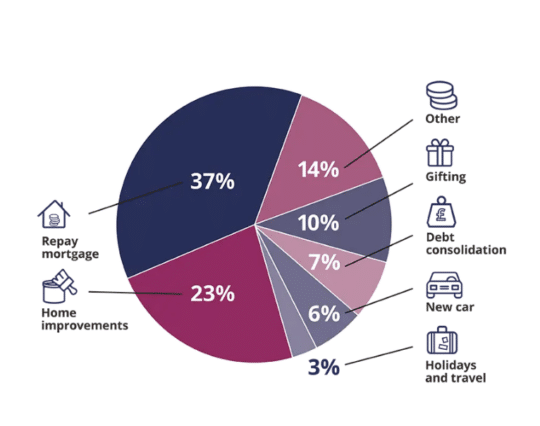Selling Home to Pay for Care – What You Should Know
Our preferred equity release adviser is Age Partnership. For free and impartial money advice you can visit MoneyHelper.

Our preferred equity release adviser is Age Partnership. For free and impartial money advice you can visit MoneyHelper.
Thinking about selling your home to pay for care? This is a big decision, and you may have many questions. From average care home costs to who pays for care homes in the UK, we’ll cover it all here.
We know that understanding the ins and outs of equity release can be tricky. You’re not alone! Over 7,000 people visit our website each month to get guidance on this very topic.
In this article, we’ll go over:
- The process of selling a house to pay for care.
- How to get a realistic quote for your home.
- What a Deferred Payment Agreement is and how it works.
- The benefits and drawbacks of a Deferred Payment Agreement.
- How to protect your home from needing to be sold to pay for care.
We have lots of helpful advice to guide you through the process. We’re here to help you understand and make the best choice for your situation.
Who pays for care homes in the UK?
Care home fees may be covered by the NHS if the care is required primarily for health reasons. Otherwise, the care home may be (partly) paid for by your local council. Or you may be required to pay some or all of the fees. A means test may be required to work out who is required to pay and how much.
What are the average costs?
Research has found that the average care home fees in the UK are around £600 per week. However, Age UK states that there is a big difference between care home costs in different postcodes.
As expected, care home fees are much higher in London than anywhere else, averaging at £741 per week. Whereas in the North West, the average care home cost is closer to £500.
How equity release could help
More than 2 million people have used Age Partnership to release equity since 2004.
How your money is up to you, but here’s what their customers do…
Find out how much equity you could release by clicking the button below.
In partnership with Age Partnership.
Can I sell my mum’s house to pay for it?
It is possible to sell a house to pay care home fees. However, you may not need to sell the property straight away to pay for care. You could consider using a Deferred Payment Agreement agreement via your local council, or one of the alternative options listed at the end of this guide.
Read on for more!
Are you considering selling to cover fees?
If you are required to pay all or some of your care home fees, or if you are reading this on behalf of a loved one, the first thing to note is that there are viable options to explore. We discuss one of the most common methods of paying for care home fees using a Deferred Payment Agreement, as well as list some other options.
Join thousands of others who release equity
Age Partnership have helped over 2 million people release equity from their home.

Mrs Wareham
“I am more than pleased to have taken out Equity Release with Age Partnership.”
Reviews shown are for Age Partnership. Search powered by Age Partnership.
What is a Deferred Payment Agreement (DPA)?
A Deferred Payment Agreement is a type of unconventional loan that is used to help people pay the care home costs they cannot afford. They are offered by your local authority and work in a similar way to equity release loans for seniors.
The council will conduct a financial assessment of you, including savings and any income you receive. From these figures, they will determine what amount you can afford to pay towards care home costs yourself, and the council will pay the rest of the care home fee each week (i.e. your deferred payment). This agreement continues until you can pay all of your care home fees by yourself.
A Deferred Payment Agreement (DPA) is secured against your home and does not require any loan repayments. The debt simply grows bigger each week as the council pays a proportion of your care home fees. You only have to repay the debt once you no longer need any assistance to pay your care home fees.
The debt is usually repaid from the sale of your property. For example, you might move into care and need help paying your care home fees until you have sold your property, which may take many months or even years in some cases. Once the property has been sold, some of the sale proceeds will be used to pay back the amount owed to the local council. You do not need to sell your home if you can repay with other means.
If you pass away before repaying your Deferred Payment Agreement (DPA), the money will need to be repaid from your estate.
» TAKE ACTION NOW: Find out how much equity you could release
What is the equity limit?
A Deferred Payment Agreement (DPA) equity limit is the amount of money the council is willing to use to pay towards your care home costs. It is based on the cost of your care, how much money you are contributing and your property value.
Does the local authority charge interest on it?
The local authority will charge interest on your deferred payments. The interest rate is set nationally by the Office for Budget Responsibility and is reviewed every six months. The interest that is charged is compound interest, which means the interest is added to the total debt of the previous month, including the interest that was added previously.
Who qualifies?
You could be offered a Deferred Payment Agreement in the following situations:
- You have been assessed by an adult social care worker and told you would benefit from moving into a care home.
- Your savings and investments are below £23,250
- You own your property by yourself with no other names on the deeds
- You have the capacity to agree to a Deferred Payment Agreement while fully understanding the process and costs. Or you have a legally appointed person who can agree on your behalf.
Can I do it to pay for my husband’s care?
It is a common story that one person who lives at the property needs to go into a care home while the other person – often a spouse – does not require care home living. For example, one partner may have been diagnosed with Alzheimer’s and their spouse cannot provide the round-the-clock care they need.
If your partner requires a care home then the property will not need to be sold to pay for their care. The individual requiring care will have their own finances assessed to determine if they need to pay for care themselves or qualify for a Deferred Payment Agreement. You will continue living in the property and the value of the home will not be taken into consideration during the assessment.
Can it be done on a jointly owned house?
Jointly owned properties may not be considered within the financial assessment if your partner or spouse still lives at the property, as explained above. The same is true if you have a close relative over the age of 60 living with you at the property or owning the property as well, such as siblings.
Moreover, any relative who is incapacitated no matter their age will still be allowed to continue living at the property.
What if I own my home with another person?
The situation may be different if you own a property with another person who is not your spouse and not living at the property. For example, you may own the property with a son or daughter who lives elsewhere. In this case, it is normal for only half of the property value to be considered within the financial assessment. And to therefore cover the costs of care, the property may need to be sold.
Can I rent my property while on a DPA?
You are allowed to rent out your property while in a care home and receive a Deferred Payment Agreement. The rental income will be added into a new financial assessment of your circumstances and could result in you paying more towards your care and your deferred payments becoming less. You will be responsible for landlord insurance etc, and you must report your rental income to HM Revenue and Customs.
What is the 12-week property disregard?
Some homeowners may need to move into a care home and have sufficient wealth to pay their own care home costs, however, this wealth is tied up in the value of their property. Thus, they have not got the actual finances to pay for their care from the outset until their property is sold or rented out.
When this is the case, a 12-week property disregard comes into effect. The local authority must disregard the value of your property within their financial assessment for the initial 12 weeks. As a result, the local authority must offer you a Deferred Payment Agreement to help pay for your care for these 12 weeks, and possibly until the home is sold or rented out.
What are the benefits of a Deferred Payment Agreement?
The benefits of one of these agreements with your local authority are:
- You get financial support to pay for your care
- You are not required to make monthly repayments
- The financial support is means-tested by your local authority, which should make it fair for everybody
- The funding support remains in place for as long as you need it, within your equity limit
What are the disadvantages?
The main disadvantage of a Deferred Payment Agreement is that the funding you receive still needs to be paid back – with interest. Because the local authority charges the maximum compounding interest allowed, the amount owed back after many months or years can be substantially more than the total amount from payments deferred, making it an expensive method of borrowing.
How can I protect my home?
There are some methods that can be used to avoid having to sell a home to pay for care. They require long-term planning and consultation with professionals. For example, you could:
- Take out a care annuity
- Rent (some) of your home (as discussed earlier)
- Consider equity release to fund at-home care services if adequate
- Protective Property Trust
What is equity release and how does it work?
Equity release is a type of loan only available to people over the age of 55. It allows the homeowner to access the equity in their home and not have to make any monthly repayments. This lump sum amount is only repaid after the homeowner moves into care or dies.
The money itself could prevent the individual from needing to move into care because they could use some of it to pay for at-home care services each day or week.
Moreover, the property only needs to be sold to repay the debt after the last surviving homeowner moves into care or passes away. So if one homeowner requires care, the equity release loan could be used to pay for their care home costs while the other homeowner continues to live at the property until they themselves require a care home or pass away.
There are two types of equity release plans available to UK residents. These are lifetime mortgages and home reversion plans. Both work as described above with some key differences. You can find them offered by equity release companies, insurers and some banks. However, many UK banks do not offer equity release mortgages.


